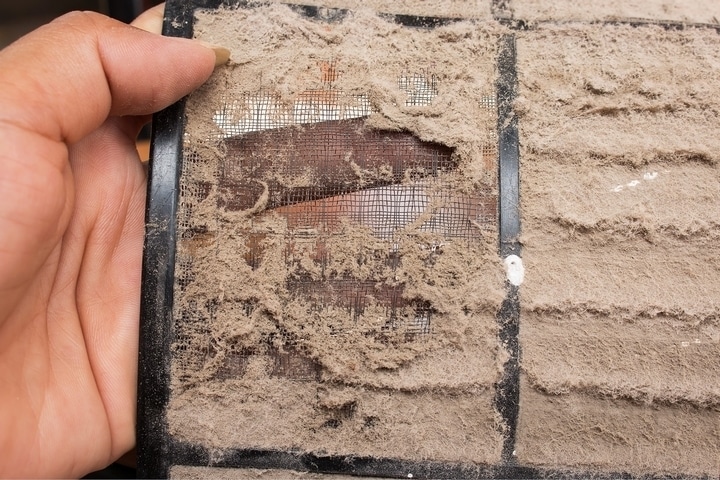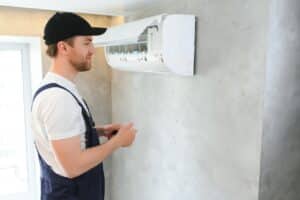An air conditioner is usually your best line of defense against the summer heat. In some instances, you may feel like your AC unit isn’t cooling enough, particularly on days when the outdoor temperatures are scorching hot. No matter how much you adjust the thermostat, you just can’t find relief from the sweltering heat. Even with the air conditioner turned to the optimal settings, you still feel sweaty and stuffy inside your own home.
You may be completely perplexed by an AC unit that is not cooling enough. When your air conditioner doesn’t work at all, the most obvious solution is to contact an air conditioner repair service for help. However, it might be more difficult to troubleshoot an underperforming air conditioner. The AC unit is technically still working, even though it suffers from a notable lack of cooling power.
What should you do when the air conditioner doesn’t seem to cool sufficiently? A great troubleshooting method is to figure out the root cause of the inefficiency. Here are the six common reasons why your AC unit is not cooling enough:
1. The AC unit is affected by poorly optimized thermostat settings

A poorly optimized thermostat may be the primary culprit of an AC unit not cooling enough. The thermostat is an electronic device that controls your air conditioner’s functioning efficiency. Adjusting to the right thermostat temperature isn’t always clear-cut and straightforward. Sometimes, it may require a few precise tweaks before you achieve a comfortable cooling temperature.
When the AC doesn’t feel cool enough, the simplest fix is to lower the thermostat temperature by a notch and see if that makes a difference. You should notice the effects quickly when a refreshing wave of cold air is introduced to your house. Among the newer types of thermostats, there are numerous settings to automatically detect the optimal indoor temperature. Keep experimenting with these thermostat settings until you find a balanced temperature level for your home.
2. The AC unit is too dirty

The entire AC system needs to be properly maintained for it to cool your home as intended. A dirty AC unit may lead to air circulation problems, limiting the effectiveness of its cooling abilities. This is a common problem with the outdoor unit, also known as the condenser, which is the part that condenses hot air into cold air. When this unit becomes too dirty, the debris can impede on the heat transfer process, so the overall AC performance decreases.
From time to time, examine the state of your outdoor unit. Is it covered with fallen leaves? Are there weeds growing nearby? Make sure you clear the area and clean the condenser thoroughly. There should be plenty of room around the condenser, allowing it to release air properly. No shrubs, bushes, weeds, or vegetation should grow within the surrounding areas.
In addition, you should clean the air conditioner’s cooling coils as well. If the equipment is caked with dirt and dust, the coils will have a difficult time transferring heat from inside to the outside. Since the heat isn’t being removed efficiently from the house, the air in your vents will feel warmer as a result.
3. The AC unit is low on refrigerant

The air conditioner refrigerant is an important fluid that absorbs the heat in the air. When you don’t have enough refrigerant, your AC won’t be able to cool enough. Low refrigerant levels are usually caused by leakages. Any bubbling or hissing noises from the AC unit may be a sign of a refrigerant leak.
Your AC will still run if you have a refrigerant leak problem, but the temperature won’t be nearly as comfortable. You should contact an air conditioner repair technician to fix any leaks and replenish the refrigerant levels again.
4. The AC unit has damaged parts

The compressor is a critical component that manages the flow of refrigerant between the evaporator and the condenser. If your compressor is damaged, the refrigerant won’t be able to absorb the heat. As a result, the air doesn’t get cooled enough. In many instances, you’ll need a replacement compressor to fix this problem.
Similarly, any damages to the condenser may impact the AC’s cooling functions. A faulty or broken fan motor will make it impossible for the condenser to dissipate heat. You will need to contact a professional to repair or replace these damaged components.
5. The air filter is clogged

A dirty air filter is another common culprit for a window AC or split AC unit not functioning properly. With frequent use, the air filter often becomes filled with dirt, dust, and debris. The cool air may not be able to pass through the filter when its passage is effectively blocked.
In fact, many issues arise with a clogged air filter, leading to short-term deficiencies and long-term damages. Always change or clean the air conditioner filters on a regular basis. If your unit uses disposable filters, these will need to be replaced. If your AC unit has reusable filters, these will need to be cleaned.
6. The AC unit is too old

As with everything else, air conditioners will get older year after year. Once the units have aged significantly, they tend to work much less effectively. Its cooling ability may have diminished with old age, so the air conditioner won’t cool enough even when you optimized all the settings.
While regular repairs and maintenance can prolong the lifespan of your AC, the equipment will need to be replaced when it reaches the end of its operating life. Consult with an HVAC professional to dispose old air conditioners and get a brand new system installed.



